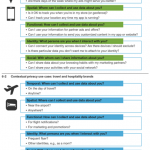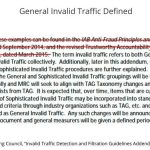ANA Wants California To Put Brakes On Broadband Privacy Proposal
ANA Wants California To Put Brakes On Broadband Privacy Proposal
by Wendy Davis @wendyndavis, August 22, 2017
A proposed privacy bill in California that could limit broadband providers’ ability to engage in online behavioral advertising “threatens to seriously disrupt Internet advertising,” the Association of National Advertisers says.

“Because this bill raises many serious concerns for both consumers and companies, it clearly deserves extremely careful consideration and must not be rushed through the state Senate,” the ANA says in a new blog post titled “CA Privacy Bill Needs to be Stopped.”
The bill (AB 375), introduced in June by California Assemblyman Ed Chau, largely recreates broadband privacy rules passed last year by the Federal Communications Commission. Those rules were repealed earlier this year by Congress, even though a large majority of the public appeared to support the regulations; an April survey by Huffington Post and YouGov reportedly showed that more than 70% of Republicans and Democrats wanted President Donald Trump to veto the repeal.
As with the former FCC rules, Chau’s bill would require Internet service providers to obtain consumers’ opt-in consent before using their Web-browsing information for targeted advertising. The California bill also goes further than the scrapped FCC rules in at least one respect: The measure would prohibit ISPs from using “pay-for-privacy” billing schemes, which involve charging customers higher fees to avoid targeted ads.
The bill cleared the state senate’s judiciary committee and its utilities committee last month, but lawmakers requested that it be revised to more closely resemble the FCC’s former rules. An amended proposal, unveiled this week, would require Internet service providers to post privacy policies and implement data security measures, among other changes.
The ANA says in its blog post that the newest version of the bill still doesn’t entirely align with the FCC’s rules. “We strongly oppose this bill,” Dan Jaffe, ANA executive vice president, tells MediaPost.
The ANA also opposed the FCC’s rules, but Jaffe says that those rules included more than 200 pages of explanatory analysis that covered issues like the use of customers’ data for security purposes.
“There are enormous gaps of information in this legislation,” Jaffe says, referring to California’s proposed bill. “It’s likely to cause enormous litigation and confusion.”
He adds that a state-by-state approach to privacy can lead to “enormous conflicts between one state and another.”
“If California passes this law, it’s highly likely that other states will pass their own laws — and then we will have a nightmare,” he says. Earlier this year, at least 21 states were considering their own versions of privacy laws.
The advertisers group also said in a letter to California lawmakers that the bill “raises a number of very serious, complex issues which could have a substantially harmful impact on the marketplace.”
AT&T, which opposes the bill, adds in a letter to California Senate leader Kevin de Leon that the measure would confuse consumers.
“The imposition of onerous privacy regulations solely on Internet service providers — and not other companies that collect and use consumer data — would give consumers a false sense of security that their online privacy is being protected,” AT&T says.
The telecom adds that the bill deprives broadband providers of “the flexibility businesses need to bring innovative products and services to their customers.”
Privacy advocates have long said broadband providers should obtain people’s explicit permission before tracking them for ad purposes. Among other reasons, advocates argue that Internet service providers are uniquely positioned to capture comprehensive data about subscribers, because only ISPs have access to all unencrypted sites visited by customers.
The ANA — along with broadband providers and Google — opposed the FCC’s scrapped privacy regulations. Opponents generally argued that all companies, including broadband providers, should be able to collect and use most Web browsing data on an opt-out basis. (Currently, many online ad companies allow allow consumers to opt out of receiving targeted ads, but require opt-in consent before serving ads based on a narrow category of “sensitive” data — like financial account numbers, or health information.)
AT&T also says in its letter to de Leon that California’s appropriations committee must assess the bill’s fiscal impact before it moves forward. If so, that committee would likely have to clear the measure by the end of next week if it is to have a chance of passage this year, according to Samantha Corbin, a lobbyist for privacy groups.
The deadline for the California Assembly and Senate to pass the bill is Sept. 15.
MediaPost.com: Search Marketing Daily
(44)













